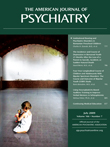Drs. Carney and Freedland Reply
To the Editor: Our review article on treatment-resistant depression and mortality following acute coronary syndrome was intended to inspire new studies and secondary analyses of relevant databases. We are delighted that Drs. Zuidersma and de Jonge have included a secondary analysis of data from the MIND-IT clinical trial to explore a point we raised in our review. However, we respectfully disagree with their statement that we “hypothesized” that the increased risk for cardiac morbidity and mortality in depressed patients with coronary heart disease is a result of the presence of a higher proportion of treatment-resistant cases among patients whose first episode of major depression coincides with an acute coronary syndrome than among those with a recurrent major depressive episode around the time of an acute coronary syndrome. Actually, we noted that we found no relationship between response to treatment and the type of depressive episode (initial versus recurrent) in the Enhancing Recovery in Coronary Heart Disease (ENRICHD) clinical trial. In ENRICHD, patients with either treatment-resistant or first-episode depression were at higher risk for mortality than those with treatment-responsive or recurrent depression. Because other studies of depression in patients with coronary heart disease have found initial episodes to be less responsive to treatment than recurrent episodes, we suggested that this potential relationship “deserves more careful study” (p. 414).
For this reason, we are pleased that Drs. Zuidersma and de Jonge examined the MIND-IT data to determine whether these subgroups overlap or, as in the ENRICHD trial, whether they were independent risk factors for cardiac events. Even though first depressive episodes were relatively unresponsive to treatment in the MIND-IT study, first episodes of depression and nonresponse to treatment were independently associated with the incidence of cardiac events. The small size of the subgroups precludes strong conclusions, but the goal of the analysis was hypothesis generation.
We also agree with the authors that poor adherence to the depression and cardiac treatment regimens may explain both poor response to antidepressant treatment and a higher incidence of cardiac events. We have previously suggested that poor adherence to the medical treatment regimen is likely to at least partially explain why depression is associated with an increased risk of cardiac events (1) , and we agree that it deserves more careful study.
In his letter, Dr. Nicholas suggests that an initially inadequate response may prompt more aggressive depression treatment, which may prove to be harmful for patients with coronary heart disease. Patients who did not respond to treatment in the ENRICHD clinical trial did not receive more sessions of cognitive behavioral therapy than those patients who responded to treatment, but they were more likely to be given an antidepressant. However, treatment with an antidepressant was associated with improved survival in the ENRICHD trial (2) . Although it is not known whether the psychotherapy sessions were more stressful or longer for patients who did not respond to treatment, we do not find support for Dr. Nicholas’ conjecture in the ENRICHD trial data. Nevertheless, the possibility that initial nonresponse to depression treatment leads to more aggressive treatment, and in turn, to greater cardiac morbidity and mortality, deserves further consideration.
1. Skala JA, Freedland KE, Carney RM: Coronary heart disease and depression: a review of recent mechanistic research. Can J Psychiatry 2006; 51:738–745Google Scholar
2. Taylor CB, Youngblood ME, Veith RC, Carney RM, Burg MM, Kaufmann PG, Shuster J, Mellman T, Blumenthal JA, Krishnan R, Jaffe AS; ENRICHD Investigators: Effects of antidepressant medication on morbidity and mortality in depressed patients after myocardial infarction. Arch Gen Psychiatry 2005; 62:792–798Google Scholar



